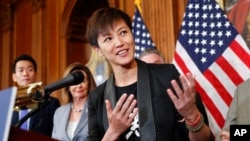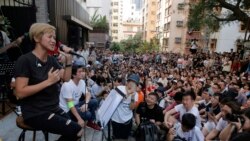Cancellation of a September concert by politically outspoken pro-democracy pop singer Denise Ho by a government-sponsored venue here has sparked fears of a widespread crackdown on artists under Hong Kong’s extensive national security law.
The move is seen as one of the first such actions against an entertainer under the law.
The Hong Kong Arts Centre, which lists the city’s embattled leader Carrie Lam as “honorary patron,” wrote to Ho that “public order or public safety would be endangered during the course of performance,” Ho said in a Sept. 1 Facebook post.
The center later apologized for the cancellation and, in an email to VOA, cited the reasons as “consideration of the relevant contractual provisions, social conditions and the related laws.”
The cancellation is widely believed to be part of a clampdown on pro-democracy artists in Hong Kong, after officials announced in June that censors would vet all movies for potential national security breaches.
Eva Li, sociology professor at the Lancaster University specializing in East Asian popular culture, called the decision “politically motivated.”
“The reason given by the HKAC … is vague and arbitrary … Such a position only seems to confirm further the speculation that the urgent cancellation is politically motivated,” she told VOA.
The spokesperson of Democratic Party in Hong Kong, Chan Po-ming, said in a statement that the cancellation was likely “a decision under pressure” and found HKAC’s allegations regarding Ho “perplexing.”
The cancellation came after Ho, who spoke at the United Nations and in the to a U.S. congressional commission to urge support for anti-government protesters in 2019, has recently became the target of pro-China newspapers.
Singtao Daily’s editorial on Aug. 26 asked venues to be “aware of the risks of hirers breaching the law” and said Ho “[verbally] attacked the Hong Kong government and police in multiple foreign occasions … there’s no reason for renting a venue for her to conduct public activities.”
Wenweipo, another pro-Beijing newspaper, said on Aug. 24 that Ho’s role as one of the main trustees of a now-defunct protester fund called 612 has prompted authorities’ attention. The 612 humanitarian relief fund, which was founded at the start of the 2019 pro-democracy movement and raised over $700,000 to help protesters, is currently under probe by the National Security Department of the Hong Kong Police Force. Authorities have required the organization to reveal the sources of its donations, as well as the personal information of its donors.
A day after the arts center canceled the concert, Wenweipo published a list of Ho’s “subversive speech and behavior” from her participation in the 2014 Umbrella Movement to promoting her September concert.
The advocate of democracy and queer rights took part in many major demonstrations during the city’s anti-government movement, which started in 2019. After her participation in the 2014 Occupy Central protests, she was banned from performing in China, and her work was scrapped online in the mainland.
Freedoms at risk amid crackdown
Li warned that the cancellation would deepen local artists’ self-censorship.
“Such cancellation is the latest example of tightening control on Hong Kongers’ freedom of speech. It inevitably further encourages performers, artists, entertainers, and their respective agents, sponsors, and companies to self-censor by avoiding touching upon ‘sensitive’ issues,” she said.
“It further proves the observation and feeling that the space for creativity and negotiation is drastically diminishing in the local entertainment scene and also the arts and cultural sector,” she said.
In early August, another well-known pro-democracy singer, Anthony Wong, was arrested for performing two songs at a political rally three years ago. The corruption watchdog later dropped the charges against Wong, on condition that the singer “maintain good behavior” for 18 months.
Prominent artists and filmmakers left the city amid Beijing’s crackdown on Hong Kong’s entertainment scene. One of the directors of 2015 local dystopian political film Ten Years, Ng Ka-leung, said on social media earlier this month that he had moved to the United Kingdom, while his colleague on the same show, Jevons Au, fled to Vancouver, Canada.
The Hong Kong government’s recent crackdown has some parallels with China’s tightening grip on mainland celebrities, Li said.
“We witness an increasing resemblance in their approaches or ‘hidden rules’ towards the entertainment industry and the arts and cultural sector as a whole … and the increasingly hardline approach to crack down on opposition voices,” Li said.
Celebrities in both Taiwan and mainland China are likely to remain silent on political issues in the near future, she added.
“The room for ambiguity has diminished to the point where celebrities remain silent, otherwise they risk being accused of unpatriotic, morally wrong or insulting the nation,” she said.






